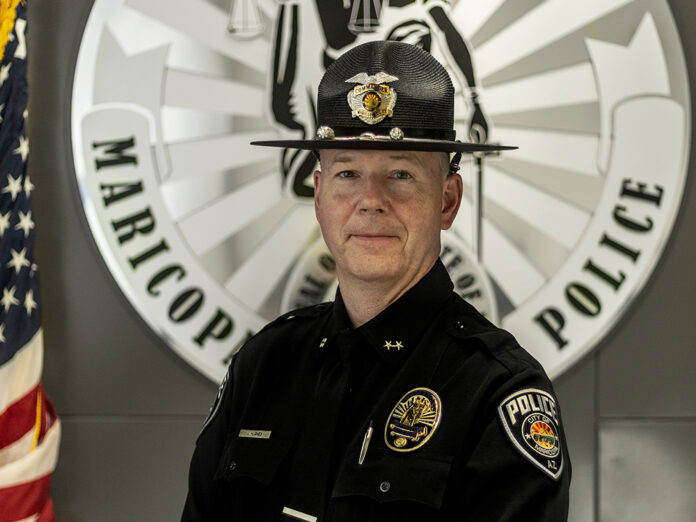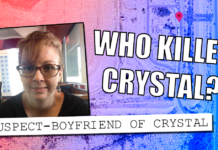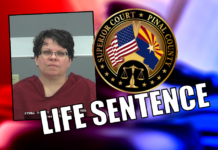
It has been a few months since my last column on how the Maricopa Police Department is policing your community.
In that column, I discussed the community policing concepts implemented at MPD. I am thoroughly pleased with the progress we made in 2021. On behalf of the proud men and women of the Maricopa Police Department, I appreciate the tremendous support we receive from our community on a daily basis.
It is imperative we continue to develop strong relationships and partnerships within our community. Policing is about people and will always be about people. This is why these relationships are critical. We are in the business of public trust and trust is fostered through relationships, competence and professionalism.
As part of our community policing efforts, our city is divided into four geographical areas called beats. Patrol officers are usually assigned to the same beat for a year. The purpose of this to create familiarity with that area of the city, provide an opportunity to get to know the problem areas of that beat, frequent location of calls for service and, most importantly, get to know the people within their beat.
Beat ownership occurs when the officers interact with the community to solve problems and prevent crime on a frequent basis. Officers getting out of their patrol units to interact with the community encourages positive interactions. These interactions lead to better-informed officers with a greater understanding of the problems within their respective beats. Community policing is not a “one size fits all” approach. We understand each community has unique challenges that need to be addressed.
Our supervisors now prioritize our officers’ commitment and involvement with the community as a critical component of their duties. In my opinion, there is a philosophical difference between answering calls, taking reports and solving problems when called by our residents. At its core, the goal of problem-solving is changing behavior or eliminating the concern. Our goal is to fix the problem if we can. This leads to a high level of satisfaction with both the community and MPD.
The majority of our residents embraces the standards of what make a city a community: getting to know their neighbors and building strong relationships to watch each other’s backs by reporting suspicious activity immediately when they see it.
I am very proud of the community policing most of our residents engage in daily. Our most frequent calls for service are consistently the call types that illustrate an engaged and concerned community. These calls include welfare checks of residents, suspicious activity and premise checks. These types of calls tell me two important bits of information: We have low crime, and our community cares about public safety and will do their part in keeping their community safe.
In my 35-plus years in this business, I have seen how a lack of caring by a community can invite crime and disorder. Criminologists have proven a correlation between public disorder and higher crime rates. Studies have shown when a community stops caring and withdraws from their community responsibility of reporting crime and assisting in criminal prosecution as witnesses, crime rates increase significantly.
It is my pleasure to work in such an engaged and caring community. The proud men and women of MPD are doing some great work. But a lion’s share of the credit goes to our residents for caring and taking a “not-in-my-city approach.”
MPD will continue to address quality of life issues and work with city code compliance to keep our city clean and safe. Our citizens work hard for the opportunity to live in a clean and safe city and that is what MPD is focused on; not just crime or the calls for service, but the finer details of what makes a good city great.
Sir Robert Peel, who is often referred to as the father of modern policing, stated in his seventh principle of policing:
“The police at all times should maintain a relationship with the public that gives reality to the historic tradition that the police are the public and the public are the police; the police are the only members of the public who are paid to give full-time attention to duties which are incumbent on every citizen in the intent of the community welfare.”
Peel raises a critical concept that safety and community welfare is the job of the entire community and not just the police. I applaud the great cooperation our department receives from the community. This cooperation, and the quality of our residents, is why Maricopa is one of the safest cities in the state.
This story was first published in the May edition of InMaricopa magazine.

![3 things to know about the new city budget Vice Mayor Amber Liermann and Councilmember Eric Goettl review parts of the city's 2024 operational budget with Mayor Nancy Smith on April 24, 2024. [Monica D. Spencer]](https://www.inmaricopa.com/wp-content/uploads/2024/04/spencer-042424-preliminary-budget-meeting-web-218x150.jpg)






![MHS G.O.A.T. a ‘rookie sleeper’ in NFL draft Arizona Wildcats wide receiver Jacob Cowing speaks to the press after a practice Aug. 11, 2023. [Bryan Mordt]](https://www.inmaricopa.com/wp-content/uploads/2024/04/cowing-overlay-3-218x150.png)



![Alleged car thief released without charges Phoenix police stop a stolen vehicle on April 20, 2024. [Facebook]](https://www.inmaricopa.com/wp-content/uploads/2024/04/IMG_5040-218x150.jpg)

![3 things to know about the new city budget Vice Mayor Amber Liermann and Councilmember Eric Goettl review parts of the city's 2024 operational budget with Mayor Nancy Smith on April 24, 2024. [Monica D. Spencer]](https://www.inmaricopa.com/wp-content/uploads/2024/04/spencer-042424-preliminary-budget-meeting-web-100x70.jpg)


